Cybersecurity Awareness and Practices: Survey Results
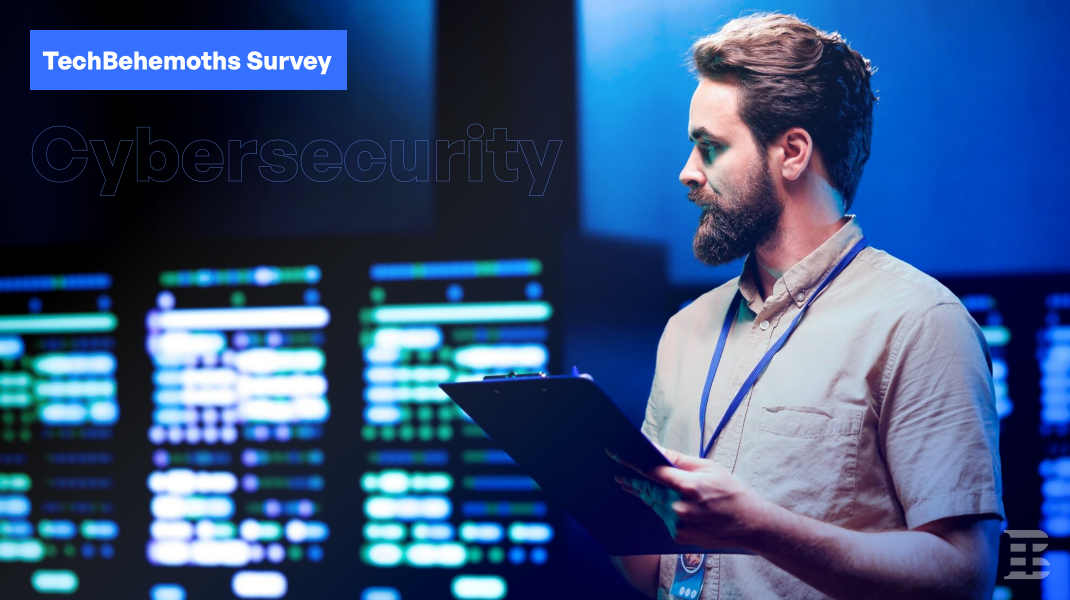
Cybersecurity has become an essential aspect of our lives.
Whether we're working, relaxing, or just going about our daily tasks we are all interconnected and rely on systems. That is why protecting our data, devices, and online identities is no longer a luxury, but a necessity.
TechBehemoths surveyed 1,585 IT companies across 62 countries from January 15-22, 2024 to investigate how aware organizations are of cybersecurity threats and their cybersecurity practices.
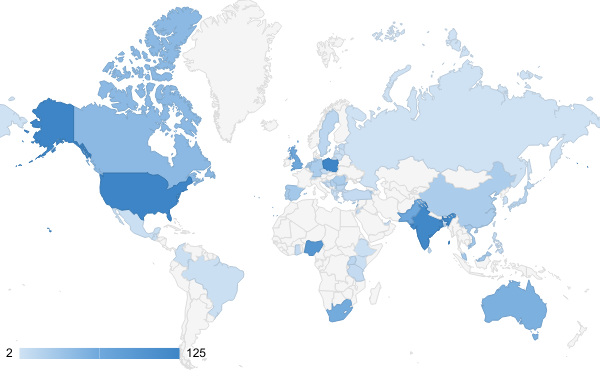
Survey Respondents’ Profile: Position and Company Size
In addition to demographics, survey respondents can be categorized by their roles within the company and company size.
According to the survey results, 28.7% of respondents are CEOs and 15.6 % of respondents are founders of IT companies. At the same time, 13.7 % are CTOs, and 9.5% identified themselves as chief security officers and cyber security managers.
Other respondents mentioned that their positions are related to digital marketing, operational managers, and business development managers.
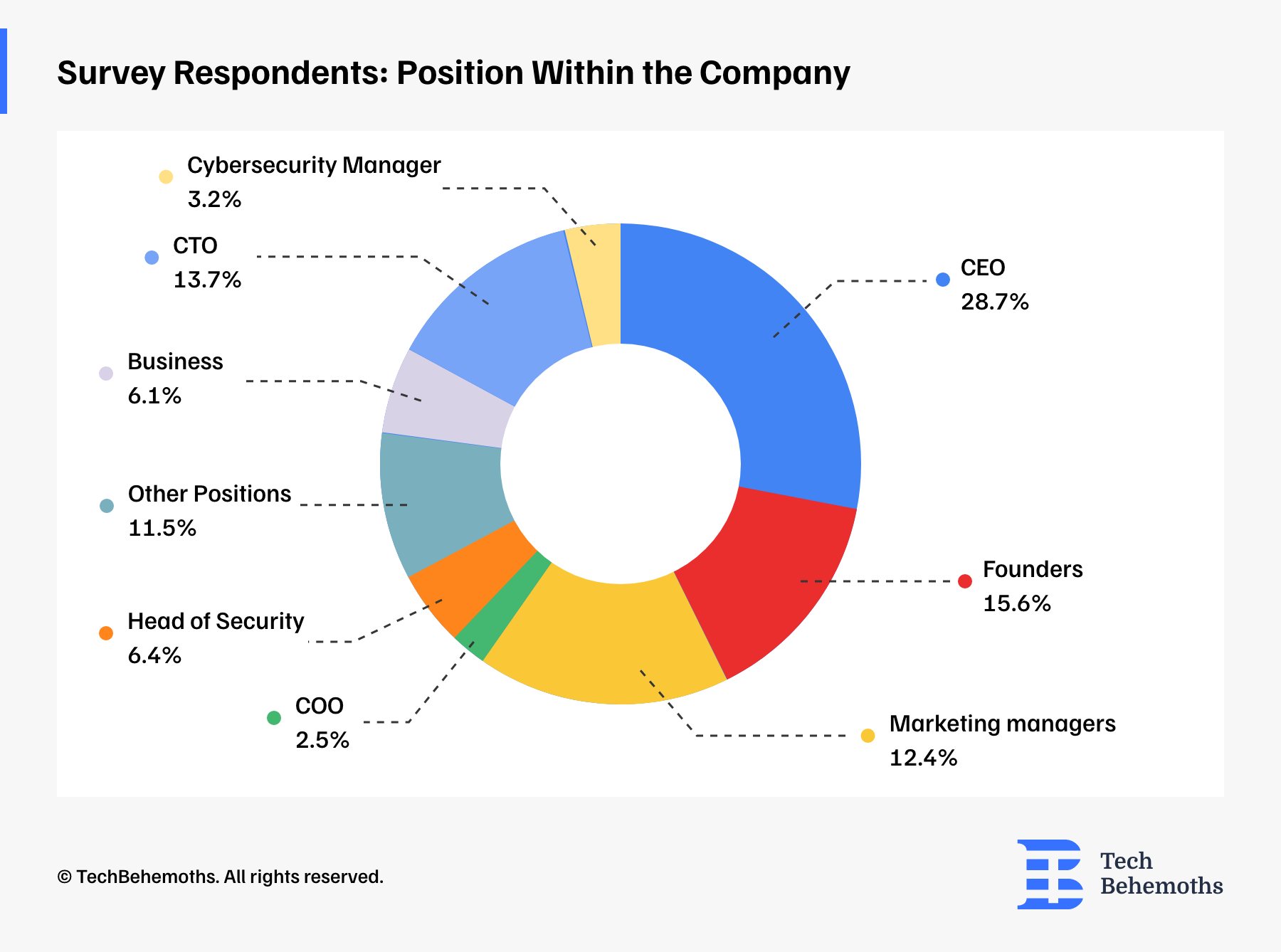
In terms of company size that survey respondents represent, the distribution is almost equally divided between the four size groups, and the results are as follows:
-
Small companies with 2-9 team members: 34.4%
-
Slightly larger companies with 10-20 team members: 23.3%
-
Companies with 20-50 team members: 21.1%
-
Larger companies with 50 or more team members: 21.1%
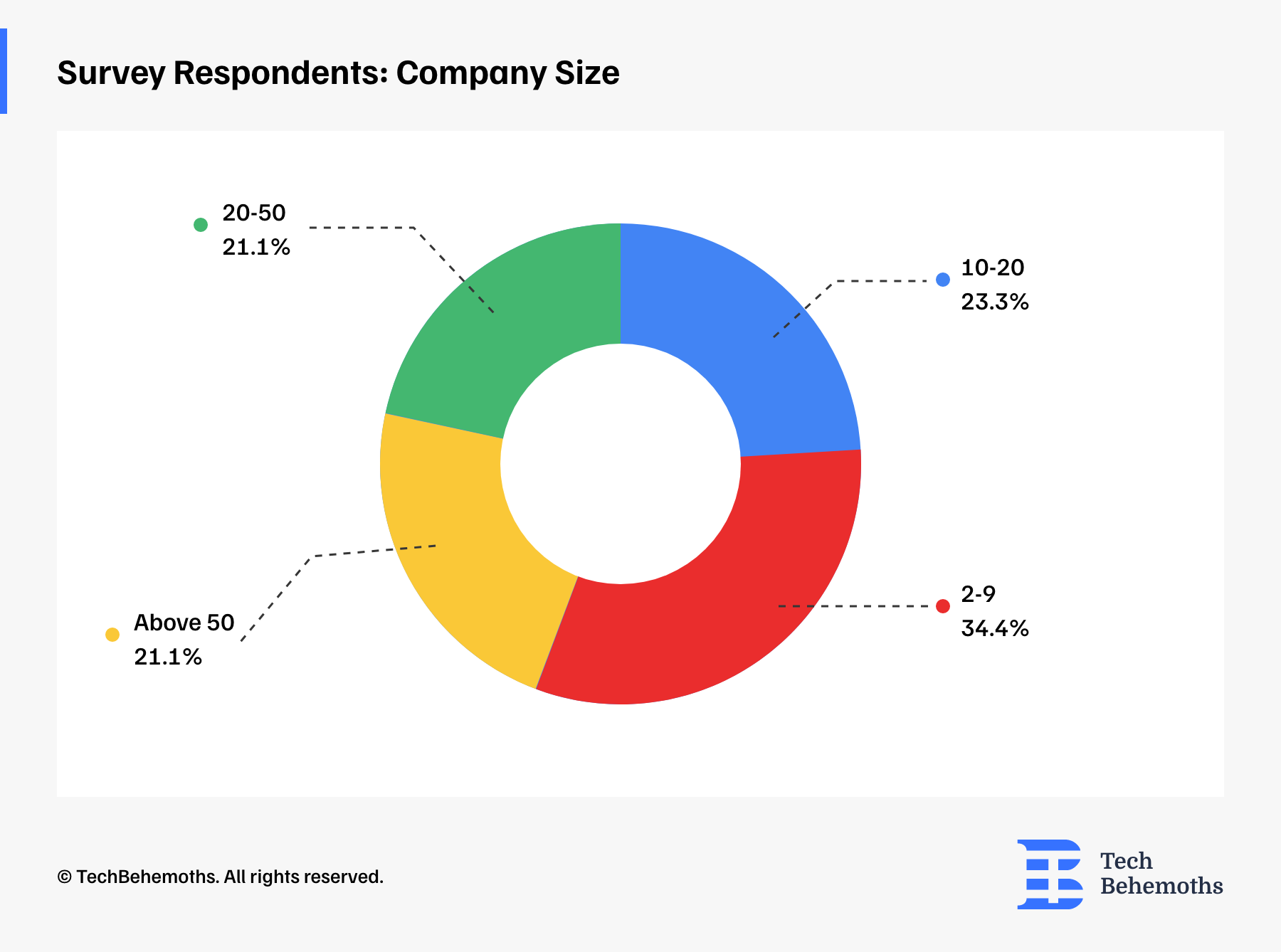
The survey attracted participation from companies across diverse industries with a focus on sectors particularly susceptible to cyber threats due to their advanced technologies and sensitive information.
The key findings indicate a strong focus on specific services:
-
Software development (65% or 412 companies)
-
IT services (59.6% or 378 companies)
-
E-commerce:( 33.8% or 214 companies)
-
Artificial Intelligence: (21.1% or 134 companies)
-
Cloud services: (21.1% or 134 companies)
-
IoT development: (12.3% or 78 companies)
Additionally, 30.9% of companies are involved in various other specialized services, showcasing the diversity within the surveyed industries.
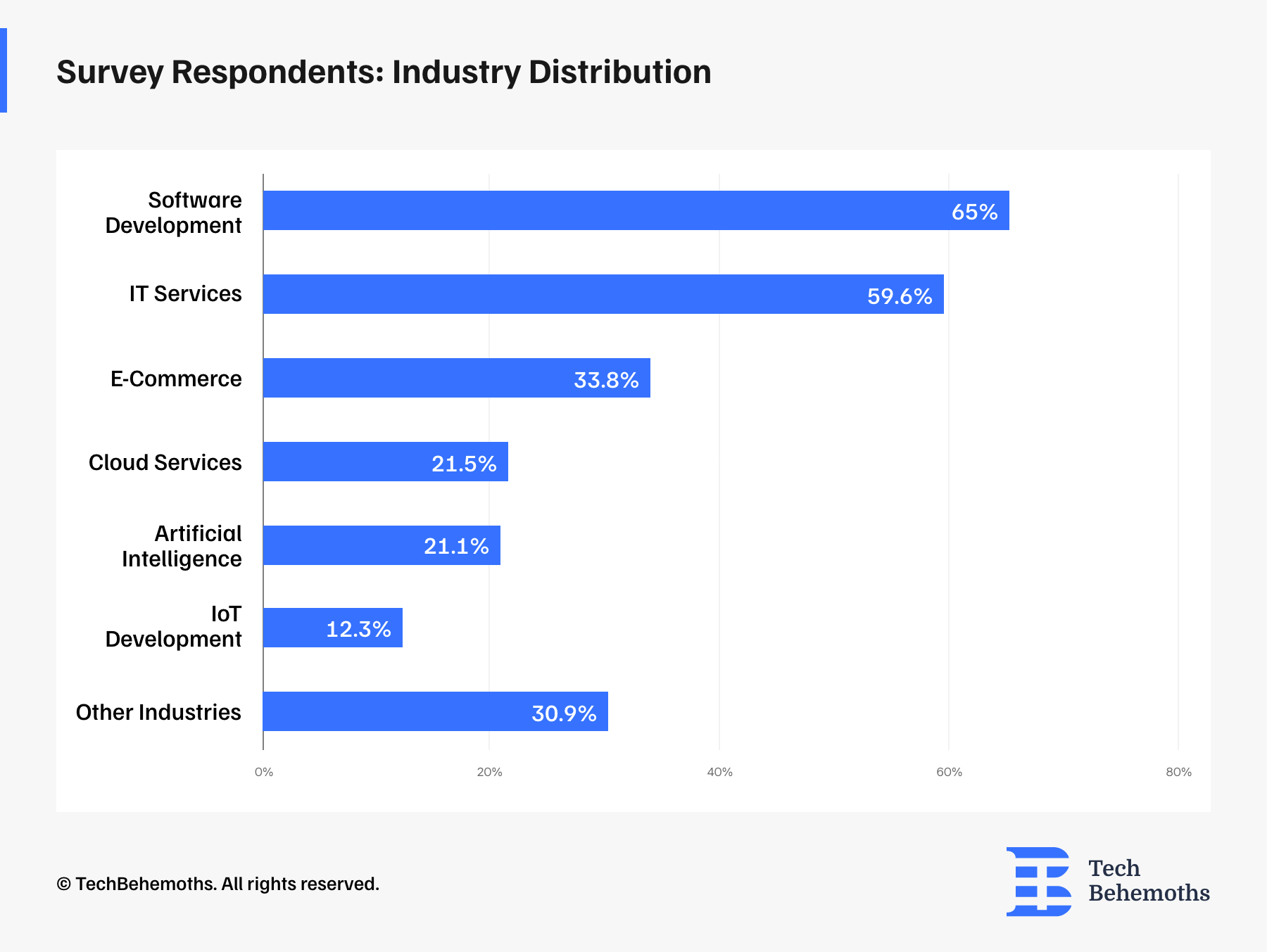
Cybersecurity Team Presence
When asked if the companies they represent have a dedicated cybersecurity team, 42.9% of respondents said yes, while more than half, 57.1%, answered in the negative.
It is intriguing to note the correlation between company size and the presence of a cybersecurity team.
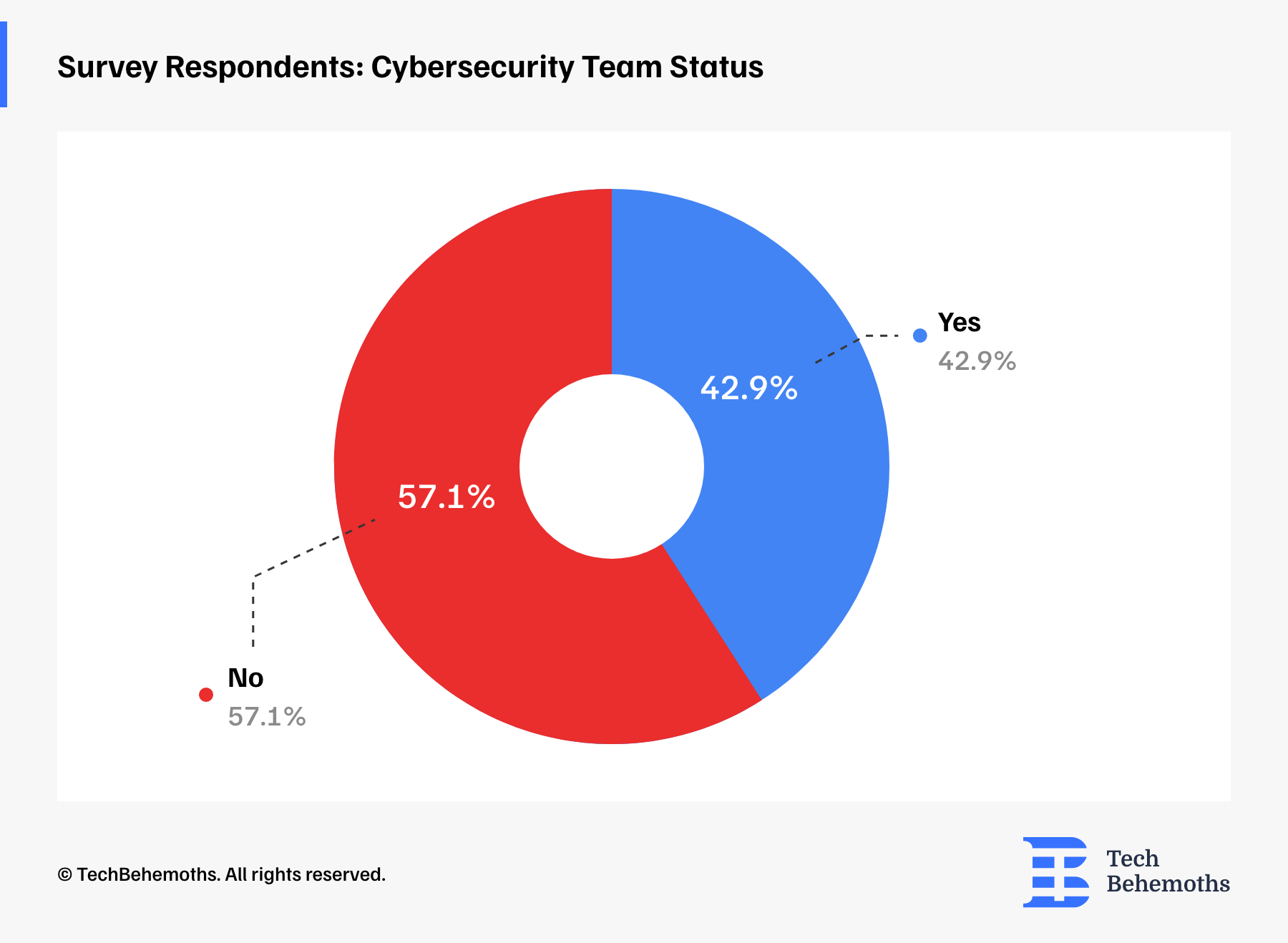
Small companies, typically with 2-9 team members, and slightly larger ones often do not have a dedicated cybersecurity team. In contrast, companies with 20-50 team members or larger entities with 50 or more team members tend to have established cybersecurity staff.
This trend says that as a company gets bigger, it's more likely to have its own cybersecurity team. It highlights how important cybersecurity becomes as the company grows, showing that larger organizations increasingly realize the need for dedicated measures to protect their digital assets.
Company's Cybersecurity Awareness
When measuring organizational awareness of cybersecurity threats, on a scale of 1 to 5, with 1 representing the lowest awareness and 5 indicating the highest, respondents provided the following insights:
-
Minimum Awareness (Score 1): 0.30%
-
Limited Awareness (Score 2): 2.50%
-
Moderate Awareness (Score 3): 15.10%
-
High Awareness (Score 4): 29.70%
-
Exceptional Awareness (Score 5): 51.45%
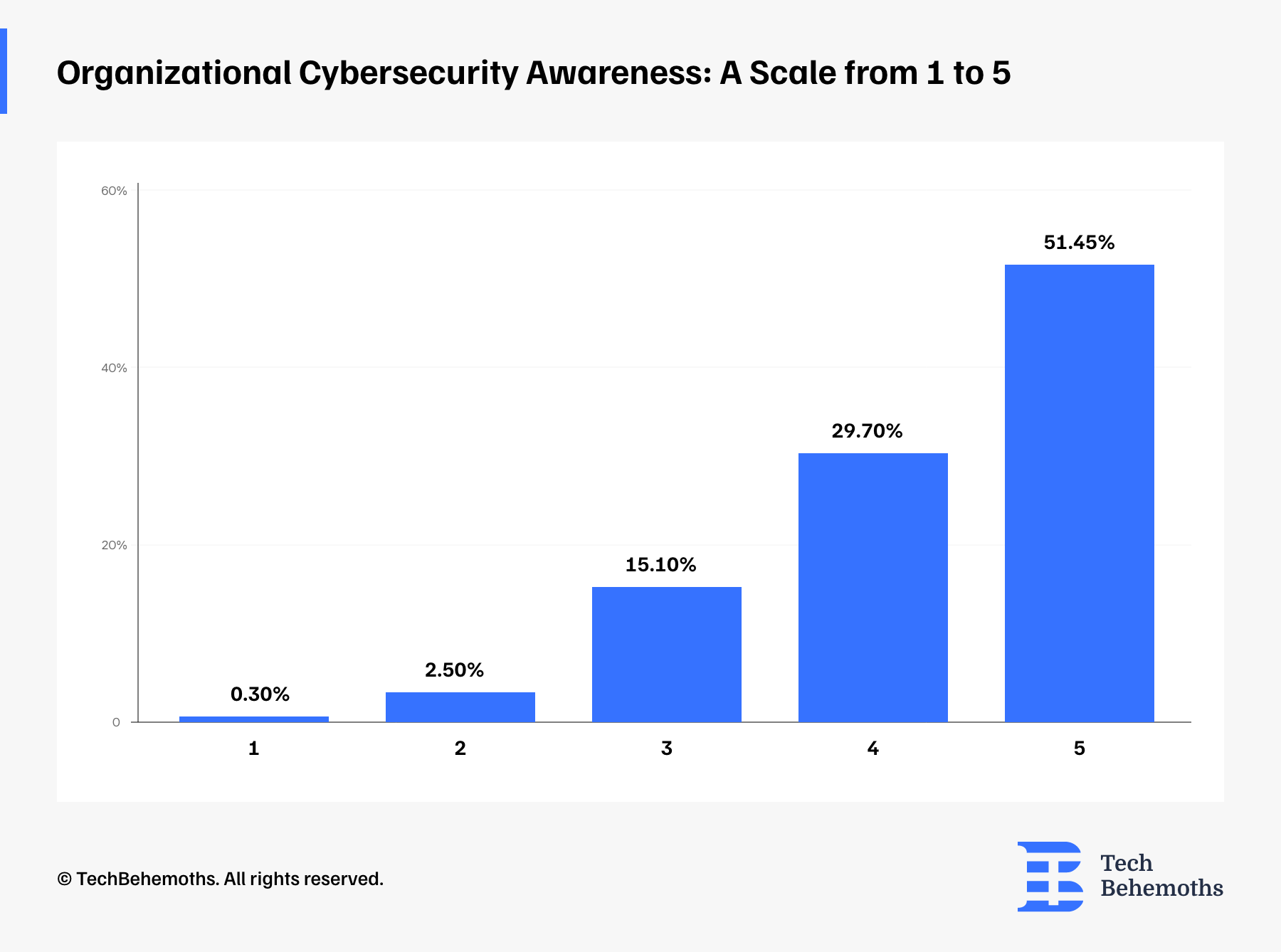
The majority of respondents (51.45%) expressed a high level of confidence in their organization's awareness of cyber security threats, giving a top rating of 5. About 30% believe that awareness is substantial (Score 4), while 15.10% consider it to be at a moderate level (Score 3). Only a small percentage feel that they are not so aware -2.50% (score 2) or almost clueless - 0.30% perceive it as extremely low (Score 1). Overall, it appears that most are confident in their organization's understanding of cybersecurity threats, which is encouraging.
Top Concerns in Cybersecurity Threats
Cybersecurity threats include a wide range of malicious activities. As technology continues to advance, so do the capabilities of those seeking to exploit vulnerabilities in systems and networks.
The survey data shows that the top three cybersecurity threats of concern are
-
data breaches (75.1%)
-
phishing attacks (69.7%)
-
malware and ransomware (70%).
These threats are significantly more concerning than others on the list.
Risky hybrid or remote work environments (28.4%) and cloud vulnerabilities (52.1%) are also notable concerns, as both are becoming more common these days.
Mobile attacks (26.6%) and denial-of-service attacks (34.7%) are less of a concern than the top three but still pose a significant threat to organizations.
IoT attacks (17.4%) and insider threats (26.2%) are the least worrisome threats on the list, but they shouldn't be ignored either.
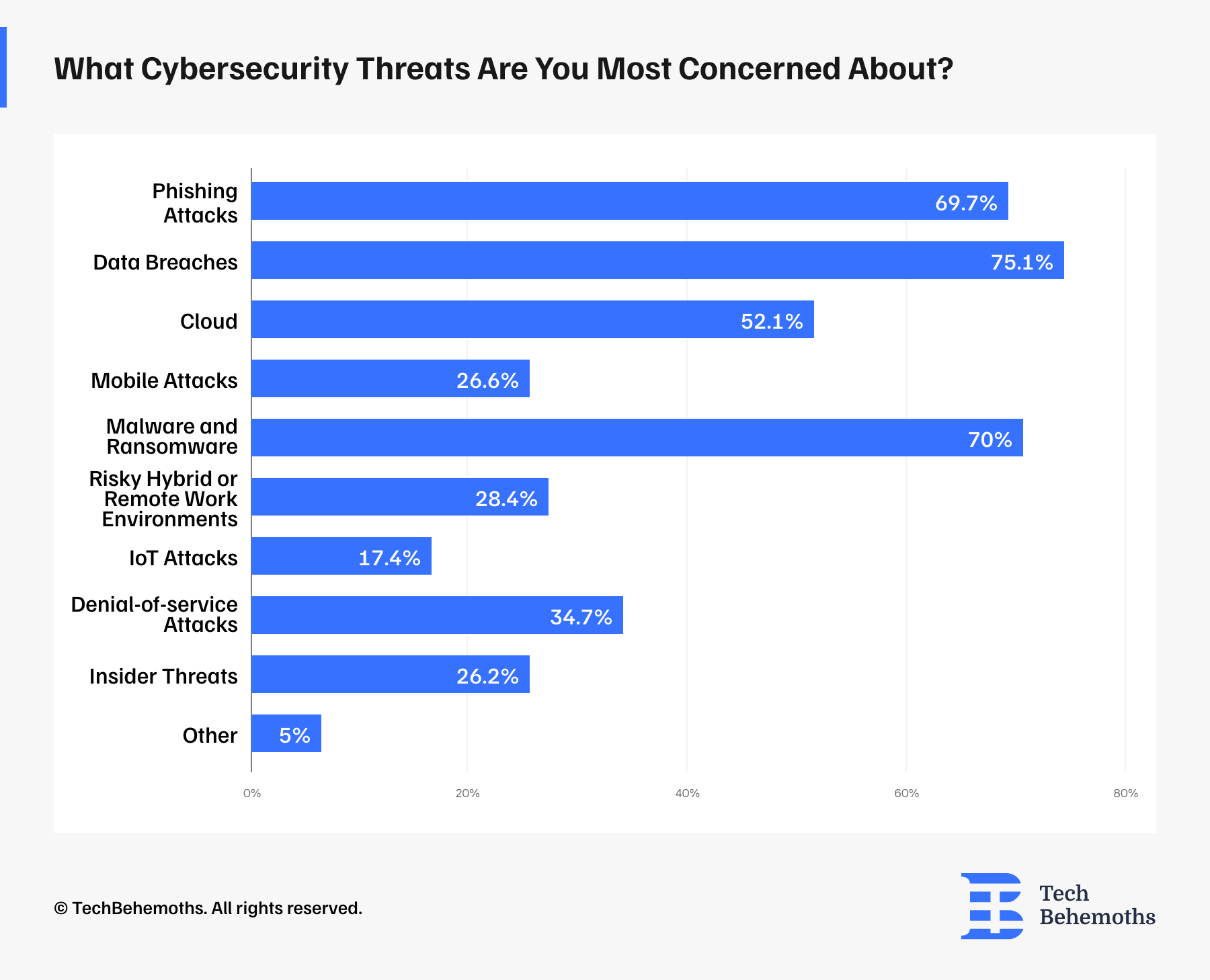
It's a constant challenge to stay ahead of them and protect from these potential dangers.
Employees' Ability to Identify and Report Threats
This is an interesting data point!
When asked about employees' ability to identify and report threats, it appears that most respondents fall into the "somewhat confident" category (47.90%). On the same note, if you add up the "very confident" and "somewhat confident" results - 90% of respondents express some level of confidence in their employees' abilities, indicating a basic foundation for detecting and reporting threats.
However, almost 10% are concerned. Even a small percentage of expressing concerns highlights potential vulnerabilities that should not be ignored. Overall, this is certainly a positive result, but it also suggests that there is room for improvement and the need for specific training or awareness programs to increase confidence in identifying and reporting threats.
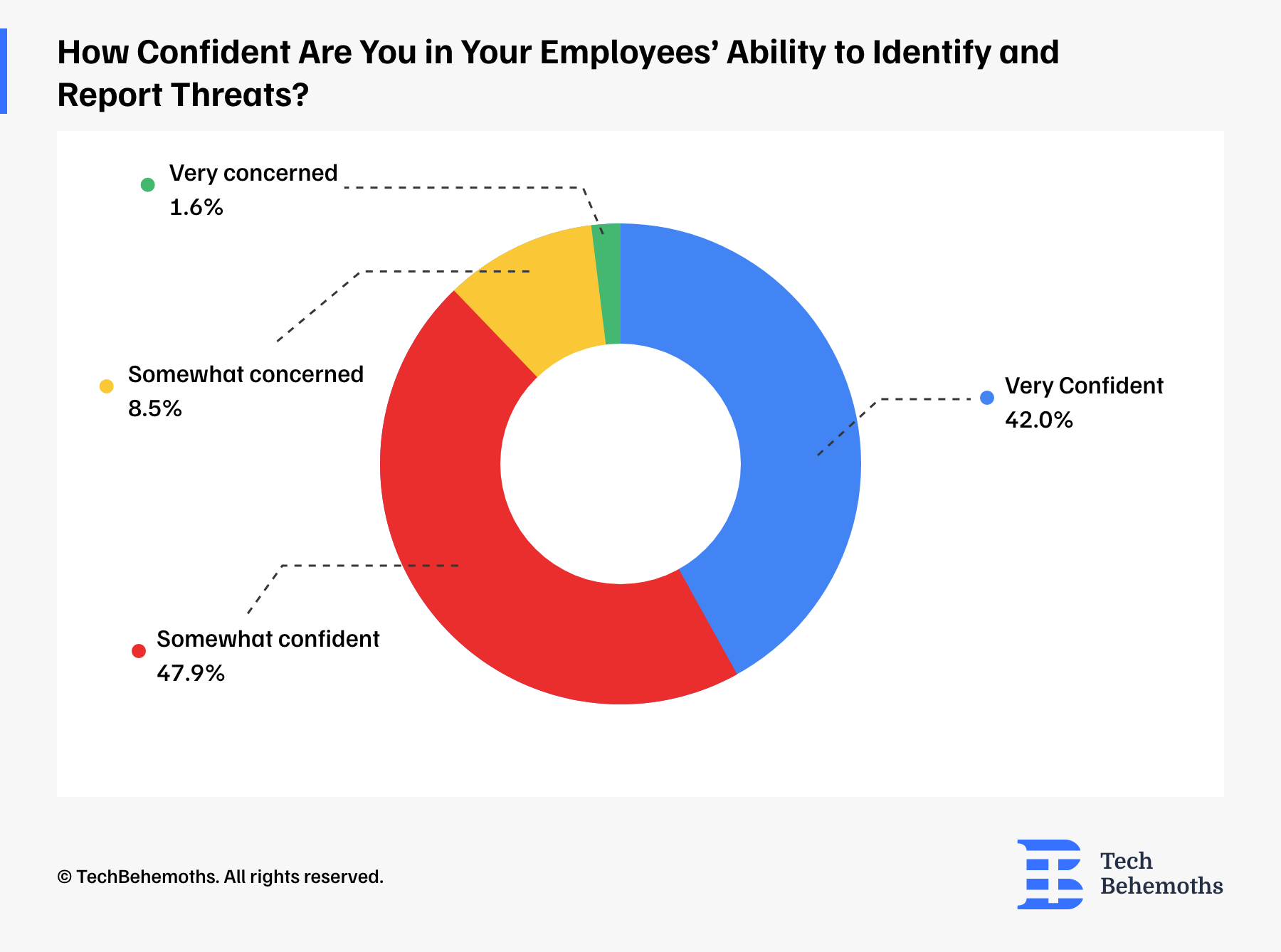
69.1% of Employees Receive Regular Cybersecurity Awareness Training
The survey data reveals that 69.10% of surveyed companies provide regular cybersecurity awareness training for employees, with 12.60% offering it monthly, 24.60% quarterly, and 31.90% yearly.
It's worth noting that the companies are from different backgrounds and countries, making almost 70% a solid overall result. However, 30.90% reported do not receive any regular training at all.
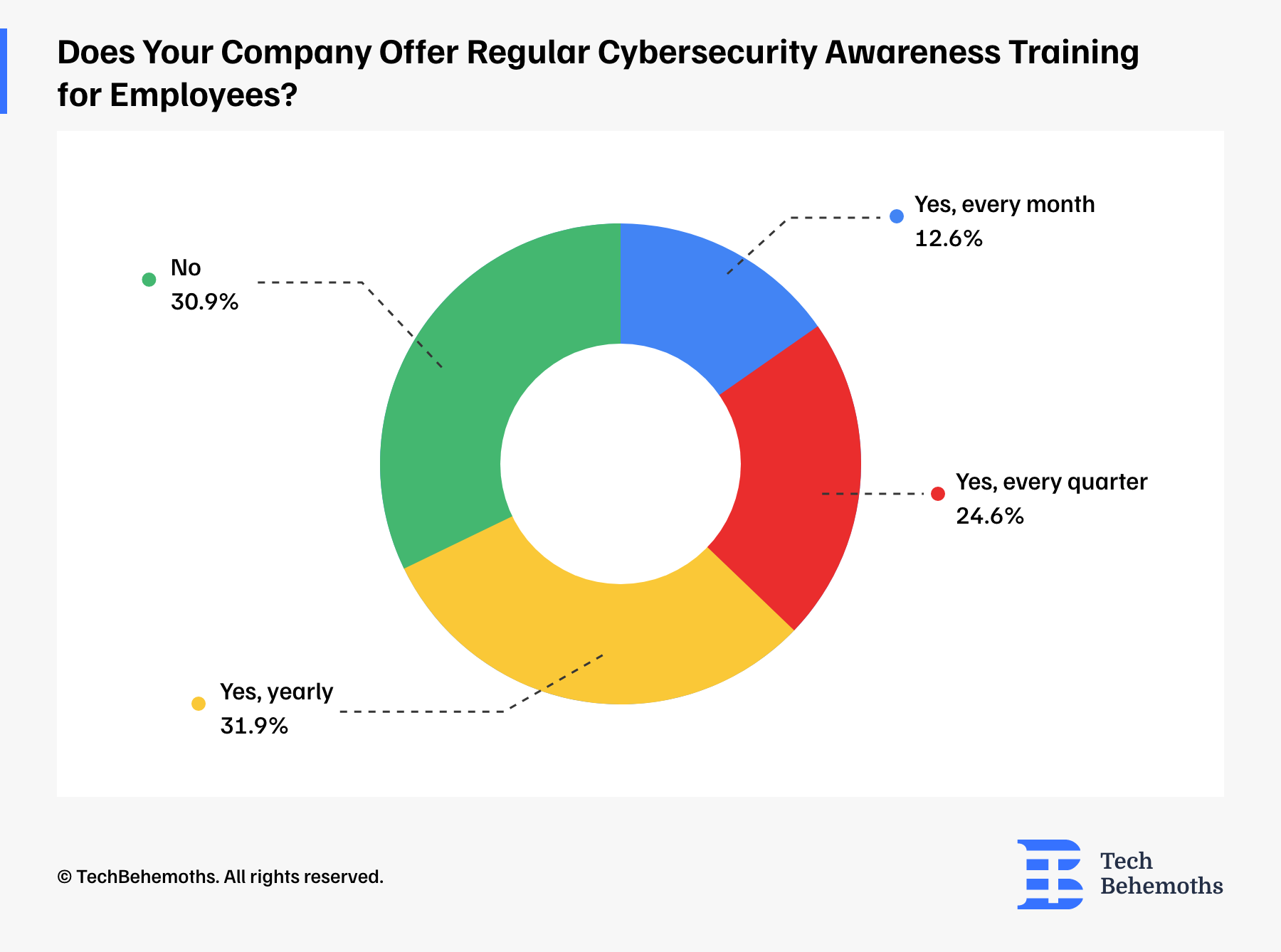
Cybersecurity: Experiences & Impacts of Incidents
Further, our survey explores online incident data and stories and how they affect people and businesses. Over a third (36.6%) of the IT companies reported experiencing a cybersecurity incident. This points out the presence of cyber threats even within organizations with expertise in this domain.
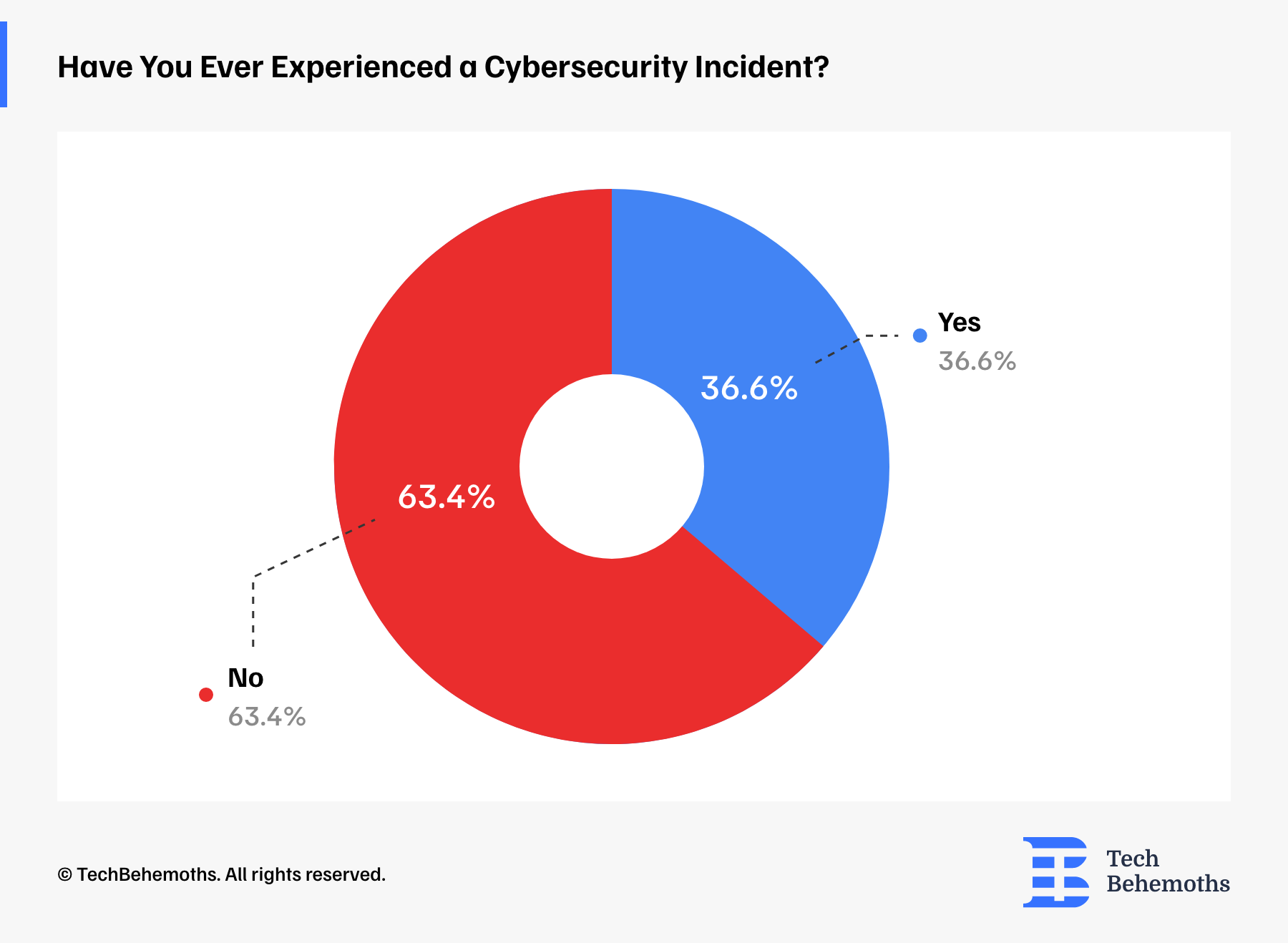
Over 40% of Companies See Different Cyberattack Consequences
To ensure the confidentiality of the companies who provided information, we will not disclose their names.
Of those affected, 43.31% reported consequences in various categories, including operational disruption, customer impact, financial loss, and website issues, indicating that incidents can affect various aspects of a company's operations, including finances.
-
11.29% reported financial losses
“We had to go offline and placed projects on hold which cost us so much.’’
“We lost data for a certain company we were working for and had to start the project again which cost us a lot of money.”
-
16.93% faced operational disruptions
’’Caused us a lot of trouble with our internet speed in the office. So our efficiency was hurt.’’
“It caused additional work for two days for the entire team.”
-
15.32% experienced impacts on their clients
“It leaked some sensitive data from one of our client's servers and brought their system down for several hours.”
-
7.25% identified website issues
“Our website was attacked, and unfortunately, the hackers gained access, causing us to lose all our data”
“We have lost our website twice”.
However, notably, 27.41% reported minimal or no impact, while 15.32% successfully mitigated incidents, showing the effectiveness of some cyber security measures.
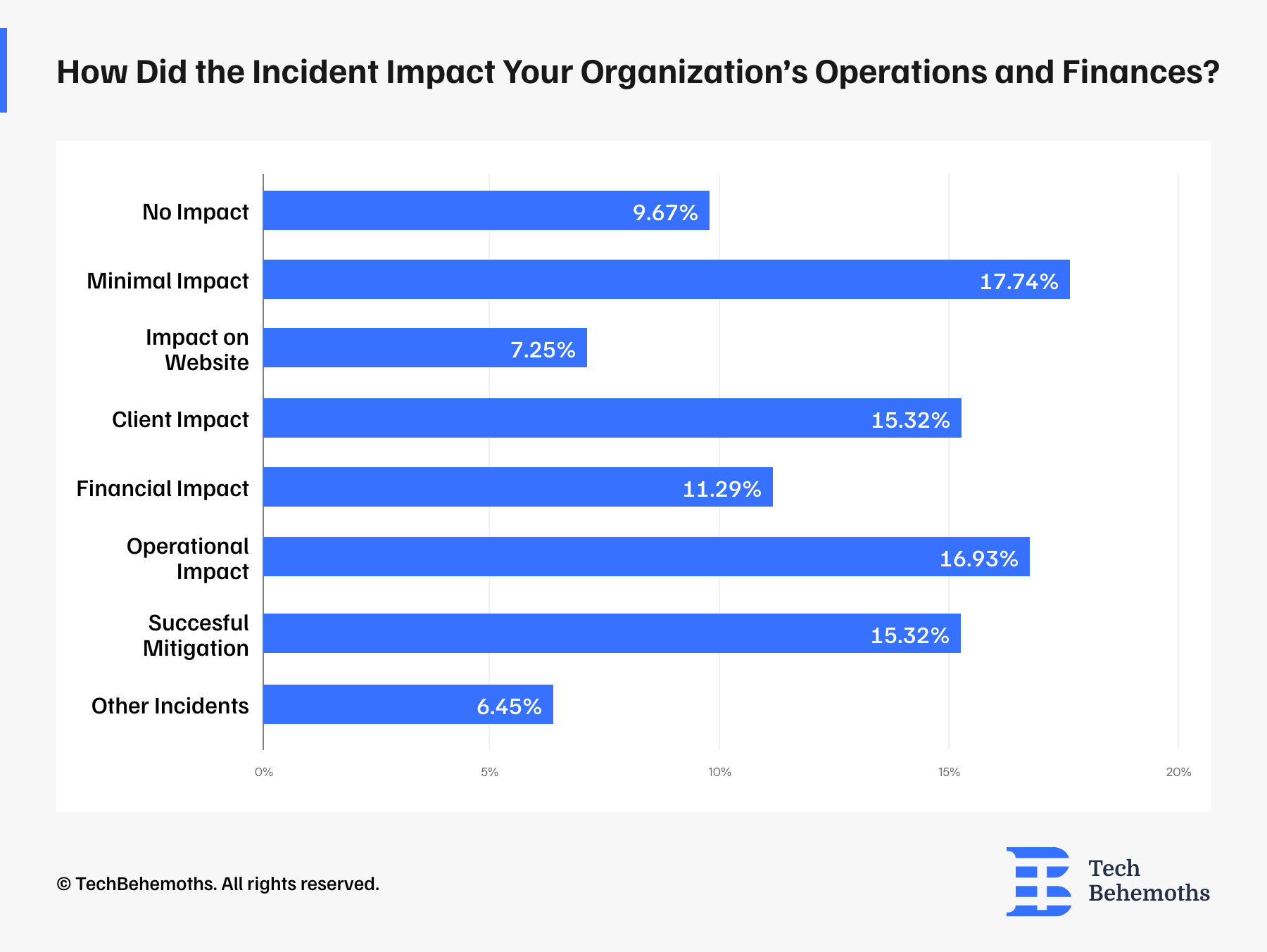
The diversity of incidents, including 6.45% classified as "Other Incidents," underscores the need for a comprehensive cybersecurity strategy to handle and reduce a wide range of potential threats.
Strategies to Stay Up-to-Date with Cybersecurity Threats
The survey reveals that companies are using various methods to stay informed about cybersecurity threats.
The top two methods are following cybersecurity experts (59.7%) and reading industry publications and news (64.9%). This suggests that expert opinions are valued and people stay informed about current events in the cyber security world. Free online resources (59.7%) are also a popular way to stay informed. It is seen as a convenient way to find information on websites, blogs, and other online sources.
Using security software (53.7%) and staying vigilant (51.1%) also have many proactive approaches, indicating that companies are taking steps to protect themselves beyond staying informed.
Less popular methods are cybersecurity newsletters (39.3%) and government advisories and reports (31%), followed by security conferences and webinars (26.2%) suggesting that these methods may be less accessible or relevant to companies' specific needs.
It's important to follow a combination of methods to stay safe online, including staying informed and taking proactive measures.
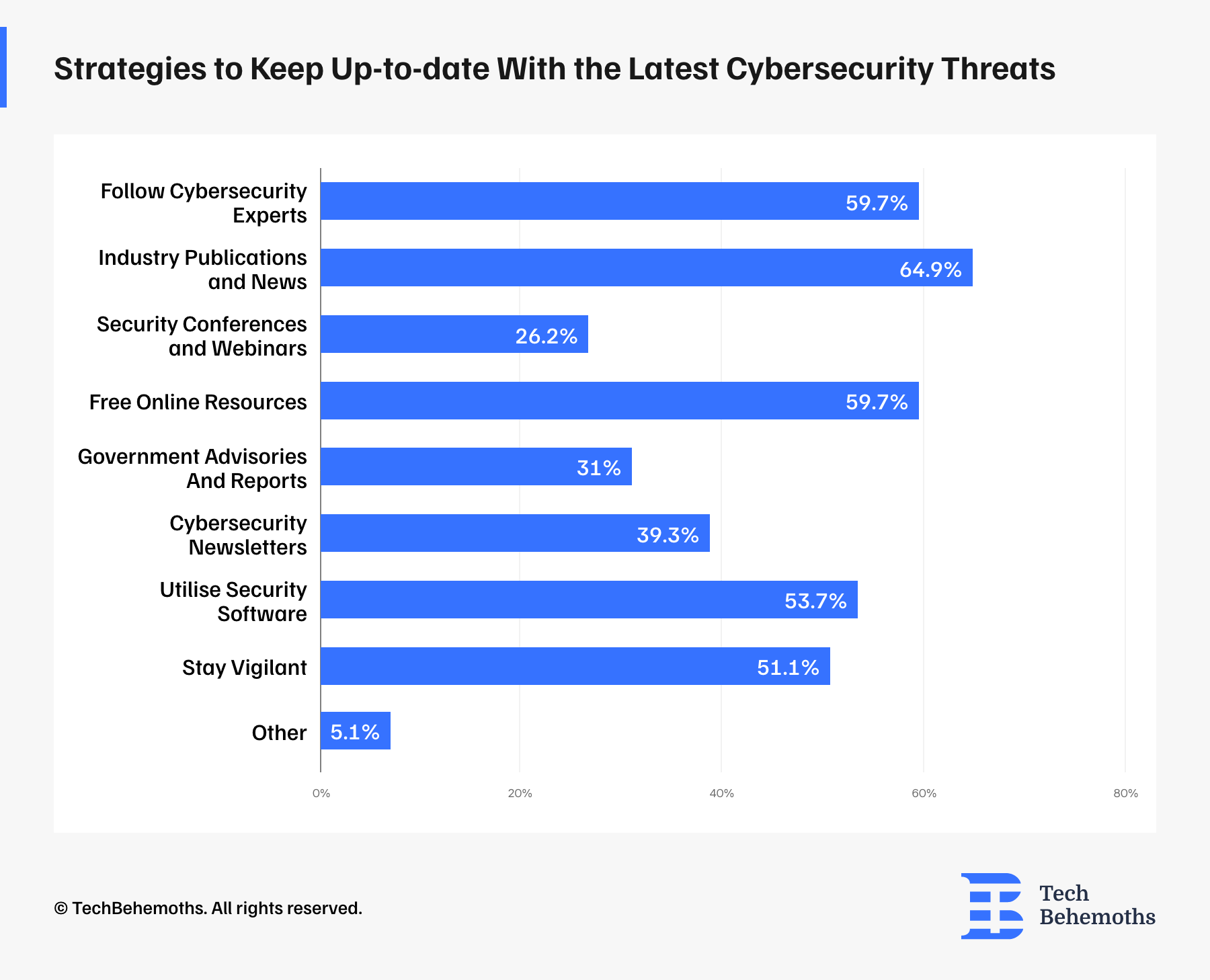
Measures to Protect Companies' Data and Systems
When we asked what security measures the surveyed companies implemented to protect their data and systems, we found that the most common measures are
-
two-factor authentication (2FA) (89%)
-
anti-virus and malware protection (82.60%)
-
firewalls (82.40%)
-
password management (78.50%)
This indicates that the majority of organizations prioritize fundamental security measures.
However, there are also some significant gaps in coverage. For example, only 40.40% of companies have intrusion detection/prevention systems and only 36.90% have a security incident response plan, which is critical to effectively managing and mitigating security breaches. At the same time, not paying enough attention to the security of external partners (30.90%) can make the organization vulnerable to potential risks. Also, not everyone uses VPNs (47.60%), which might expose sensitive data when accessing things remotely.
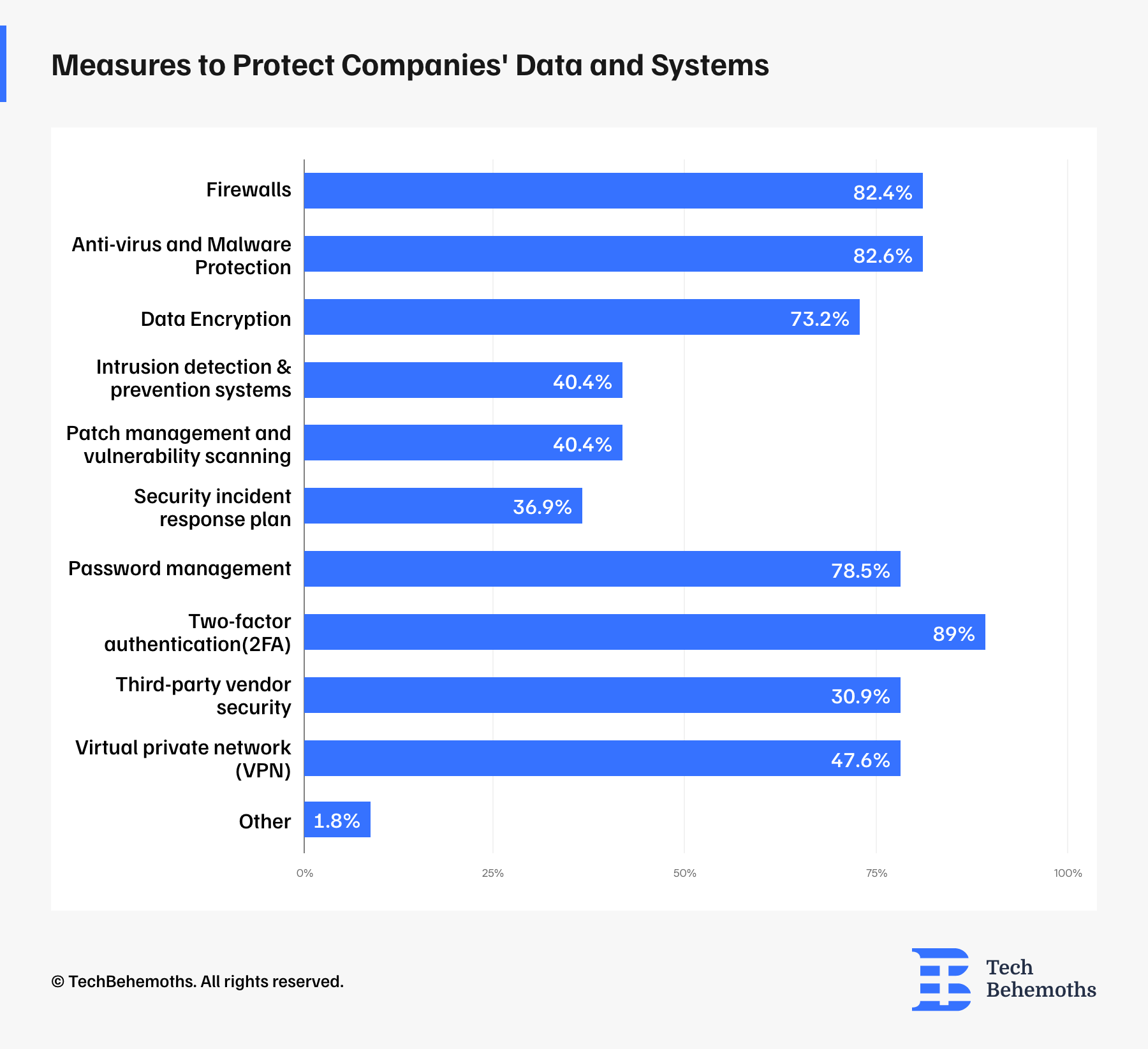
The overall security posture of the companies surveyed is mixed. While they have implemented some essential security measures there's room for improvement, especially in areas like detecting and preventing cyber-attack.
80% Rated Their Current Security Measures as Effective
The cybersecurity measures' effectiveness was potentially categorized into 5 levels (1 being least effective and 5 being most effective).
Approximately half of the respondents (45.70%) perceive their security measures as effective (rated 4), while 34.40% rate them as highly effective (rated 5). While the highest level of effectiveness is well represented, there is still notable dissatisfaction, with 17% giving a moderate effectiveness rating (3) and 2.80% rating their measures as minimally effective (2). No data points fall into category (1), indicating no situation of complete inefficiency.
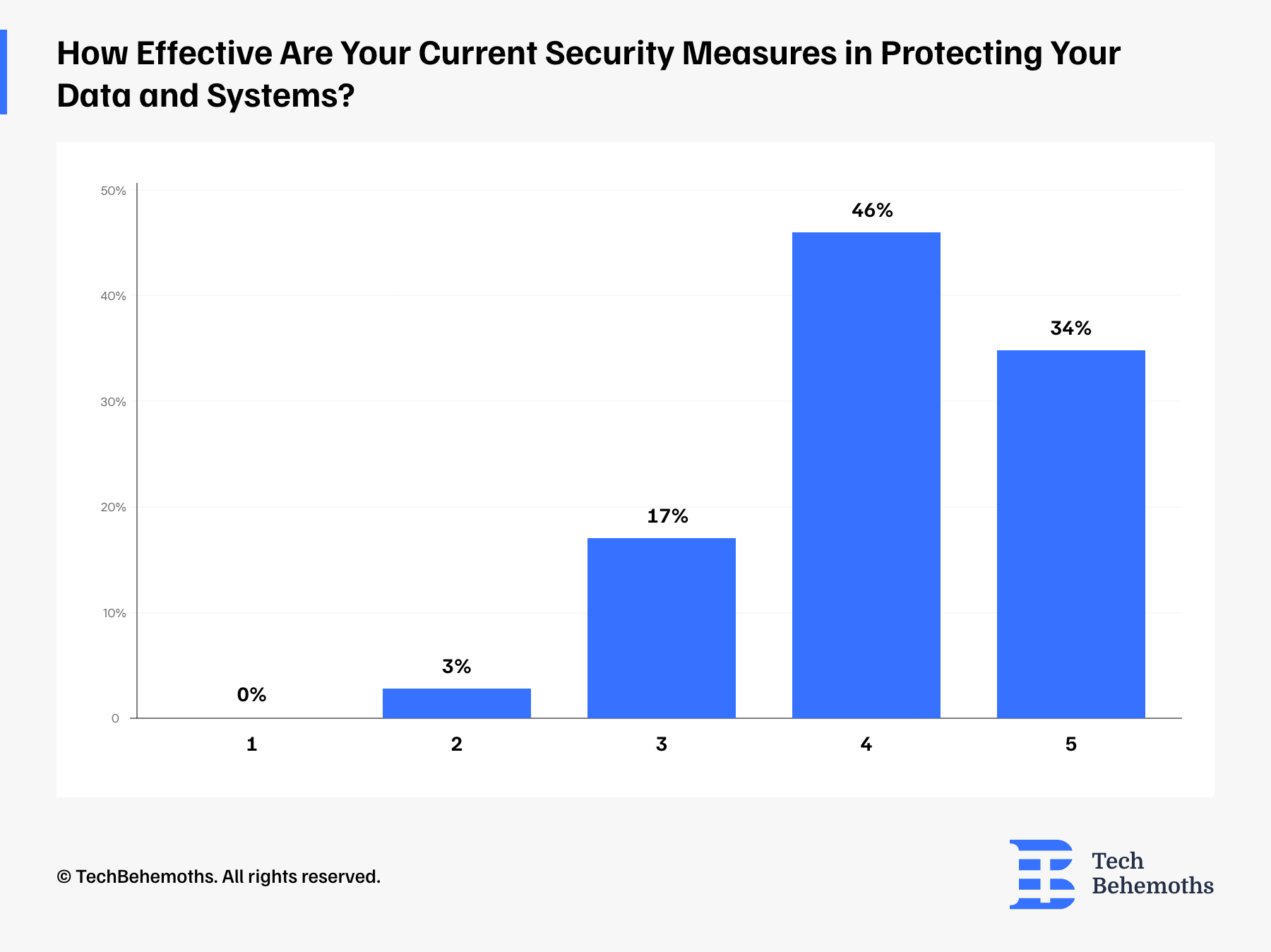
A periodic evaluation of cybersecurity measures can ensure that they remain effective against evolving threats.
How Often Do Agencies Back Up Their Data?
The importance of regularly backing up your data is big, as data can be lost in an instant. Frustration and wasted time can result if the information is not backed up.
When our respondents were asked how often they back up their data, the vast majority, 58.6%, told us "as needed," indicating an ad hoc approach without a set schedule. 34.4% quarterly backup, suggesting a somewhat regular but infrequent approach. And, a small fraction, 3.50% each, backs up annually or bi-annually, which could be quite risky for data security.
So, we see a predominant lack of regular data backups, with nearly 97% not following a set schedule (yearly, bi-annually, or quarterly). Here too it is good to know that organizations can benefit from promoting data backup best practices by ensuring that the importance of regular and consistent backups is understood in protecting against data loss or disruption.
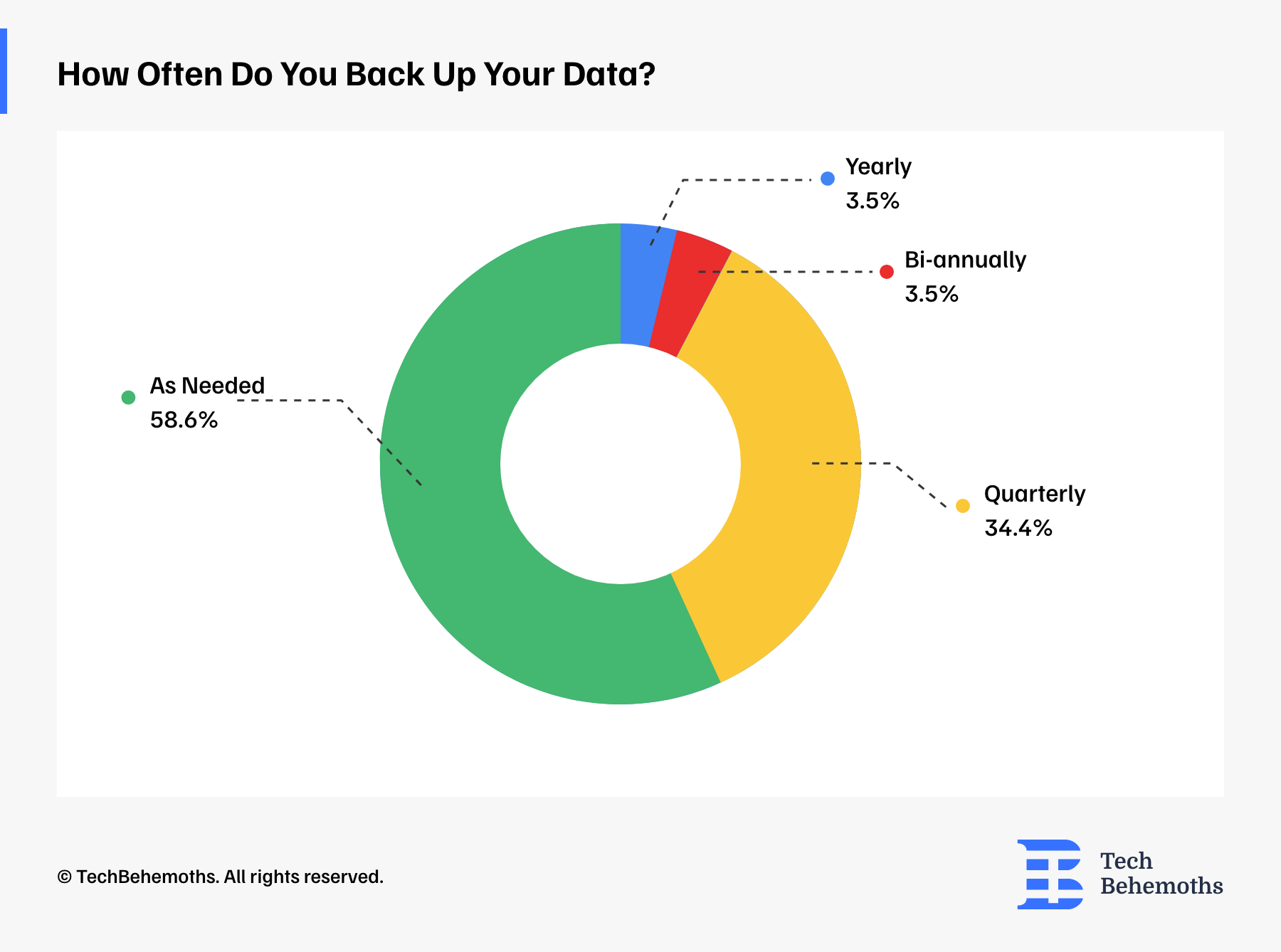
Challenges in Maintaining Good Cybersecurity Practices
The constant threat of cyber-attacks requires constant attention. However, maintaining strong cybersecurity practices is not easy.
The biggest challenge and the weakest link in security is the human factor with a total of 31.7% of responses. This includes training, education (11.8 %), as well as user awareness (11.3 %).
Pablo Pfister, CEO at 5w155 SA comes with the following idea:
“The biggest risk is the human factor. We can have the highest security standards technology-wise, but if people are not able to identify a threat, the intruder will get in. Keeping the team up-to-date and vigilant is the hardest part.”
The next challenge mentioned by 15.5% of respondents is resource constraints. This could include a lack of budget, personnel, or expertise to implement and maintain effective cybersecurity measures.
Michael Folin, IT Consultant at Wintra Advancement AB mentioned that:
“Ensuring sufficient resources, both in terms of budget and skilled personnel, is a challenge.”
Keeping up with the latest cyber threats threats, vulnerabilities, and best practices is a challenge for 9.4% of respondents. This highlights the need for constant learning and adaptation.
Anna Khachatryan, Senior Business Development Manager at Creatix Technologies states that:
“Ensuring that all software, including operating systems and applications, is up-to-date with the latest security patches can be challenging. Failure to do so leaves systems vulnerable to known exploits.”
Data privacy and security regulations are a burden for 9.4% of organizations, with managing security in remote work environments and mitigating risks associated with third-party providers at the same 9.4%. Next is AI and technological advances (8.6%), followed by data protection against unauthorized access, breaches, and leaks (6.2%).
Kateryna Stankova, Communications Manager at Empat asserts that:
“Compliance with data protection and privacy regulations, such as GDPR, HIPAA, or CCPA, can be challenging.”
It is important to understand these challenges and implement appropriate solutions so that companies can improve their cyber security status and reduce the risks of cyber attacks.
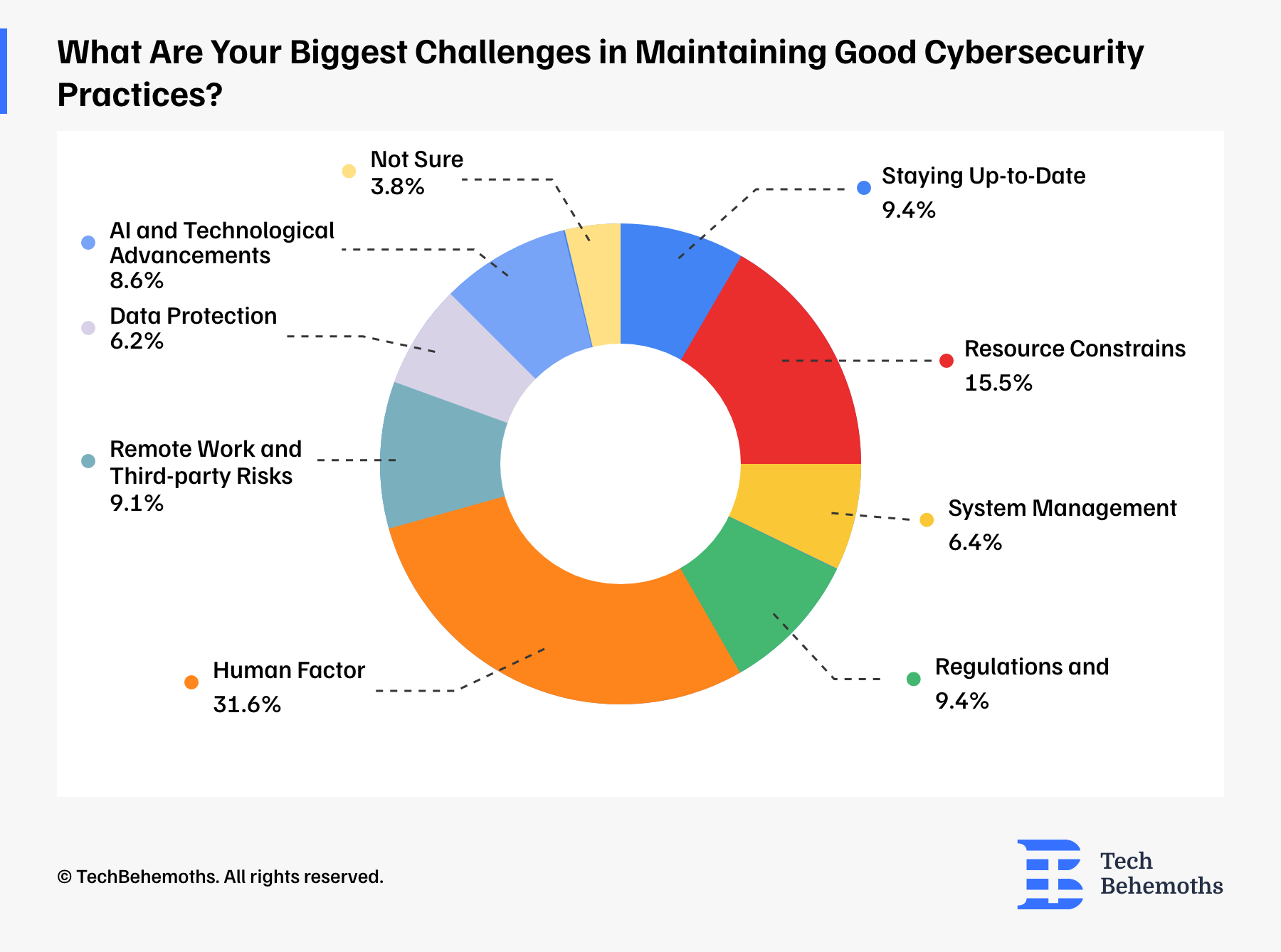
51.50% of Respondents Are Willing to Invest More in Cybersecurity Resources
Investing in cybersecurity can protect your company from cyber threats and ensure your long-term success. How willing are companies to make such an investment?
The survey data shows that 51.50% of respondents are willing to invest more in cybersecurity resources (21.50% very willing and 30% somewhat willing). This suggests that most respondents recognize the importance of cyber security and are open to increasing their investments in this area.
However, it is also important to note that a significant part of respondents (48.60%) are either neutral (33.7%) or not willing to invest more (11.40% not very want and 3.50% don't want at all). This could be due to factors such as a lack of risk awareness, a belief that their organization is not at risk or budget constraints.
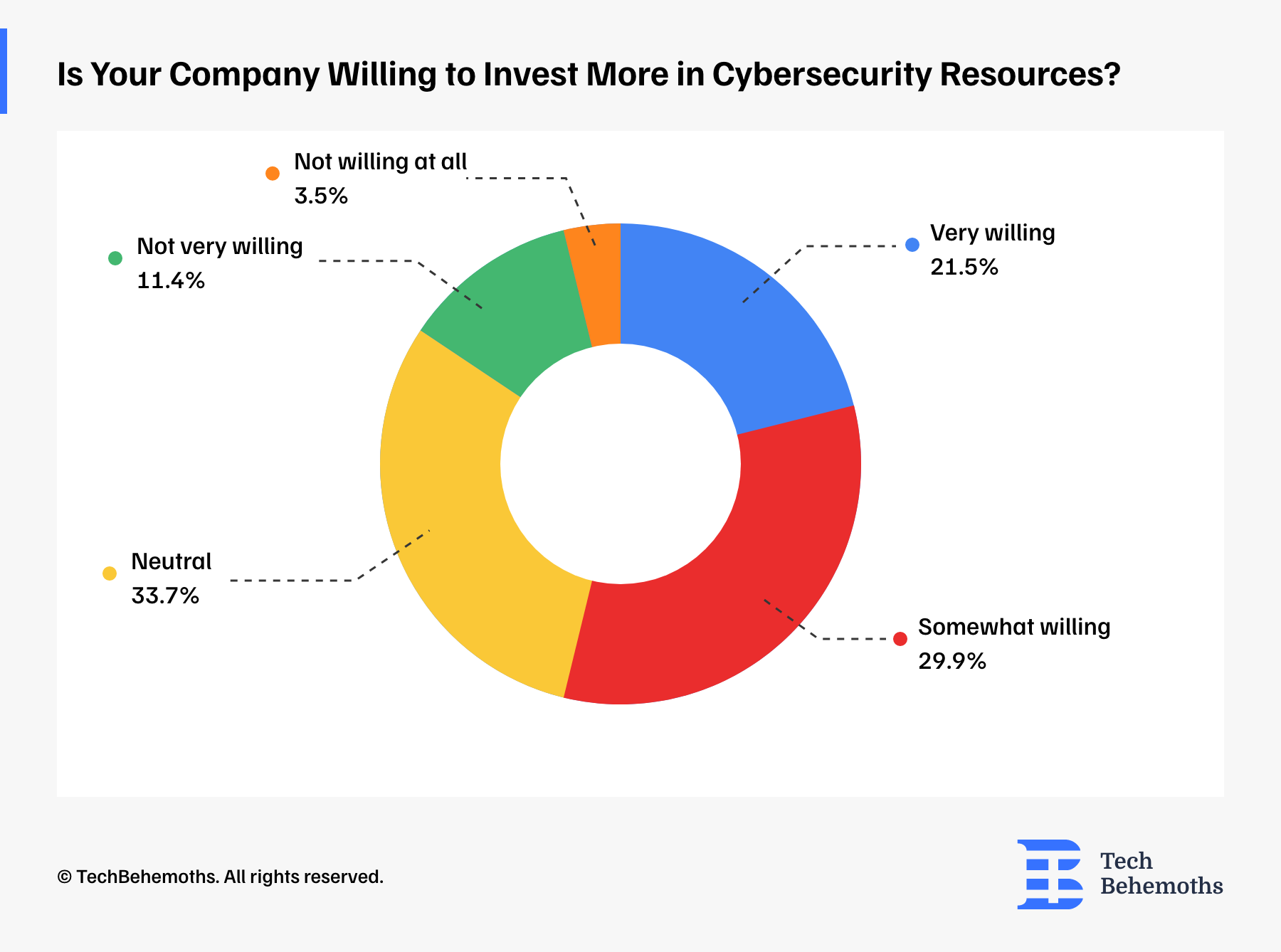
Importance of Cybersecurity to Company Overall Success
The survey results demonstrate unequivocally that cybersecurity is perceived as extremely important to the overall success of companies.
Almost 73% of respondents believe cybersecurity measures are indispensable to their success: 45.70% consider cybersecurity extremely important (5) and 27.40% consider it important (4). There is still a significant minority (28.5%) who rate it 3 or less.
These results highlight the growing awareness of cyber security threats and the increasing value placed on data protection nowadays.
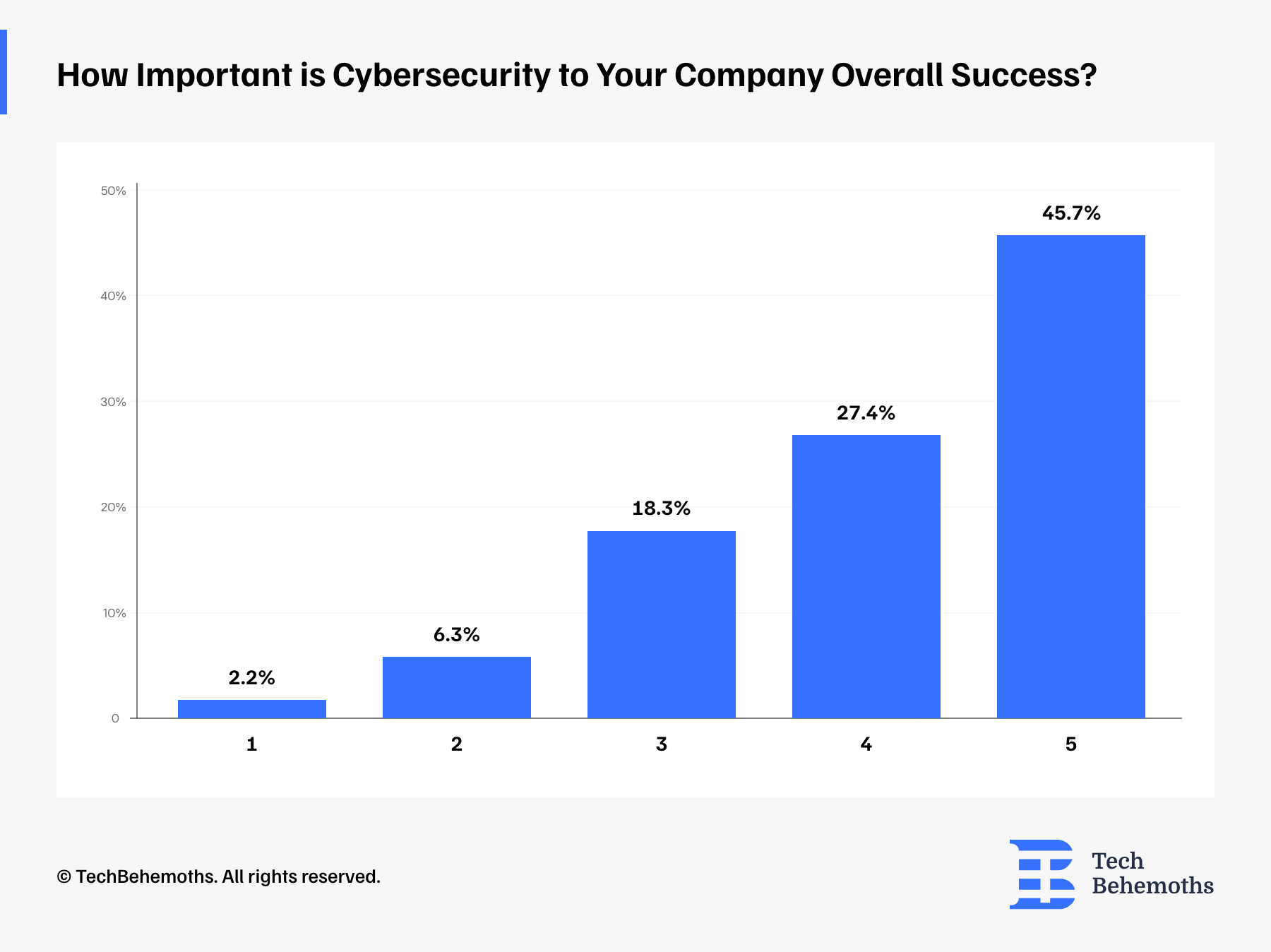
Top Priorities for Improving Cybersecurity Awareness
There is always room for better!
When asked about the top priorities for improving cybersecurity awareness and practices within the company, the most important were highlighted as follows:
- Employee training and education practices - the most significant area for improvement, with half (50%) of respondents identifying its importance. As the survey shows, employees are often the first line of defense against cyber attacks, so ensuring they have the knowledge and skills to identify and report suspicious activity is a high priority.
- Regular software updates (10.8%): Many attacks exploit known vulnerabilities in software. Keeping systems and applications up-to-date is essential to correct these vulnerabilities.
- Vigilance and awareness (8.8%) are essential within a company. Communicate regularly and keep employees informed about current threats, scams, and security updates. Encourage reporting of suspicious activity without fear of retaliation. Recognize and reward employees who demonstrate vigilance and report potential threats.
- Incident response planning is a priority for 7.7% of respondents to have a clear security incident response plan that minimizes damage and ensures rapid recovery. It is advisable to review and test the plan regularly
- Multi-factor authentication (MFA), with 7.2% identifying this as a priority, implementing MFA can significantly improve security by adding an extra layer of protection beyond passwords.
According to the survey, a small percentage of respondents (6.7%) consider regular security audits a priority. This is because security audits can identify weaknesses in the security posture and help prioritize improvements. Another 6.2% of respondents believe that investing in advanced security tools such as firewalls and intrusion detection systems can help detect and block malicious activity.
While important, investment in cybersecurity received the lowest vote (2.6%), indicating that other areas are deemed more important. However, it is crucial to ensure adequate funding for cybersecurity initiatives to achieve long-term success.
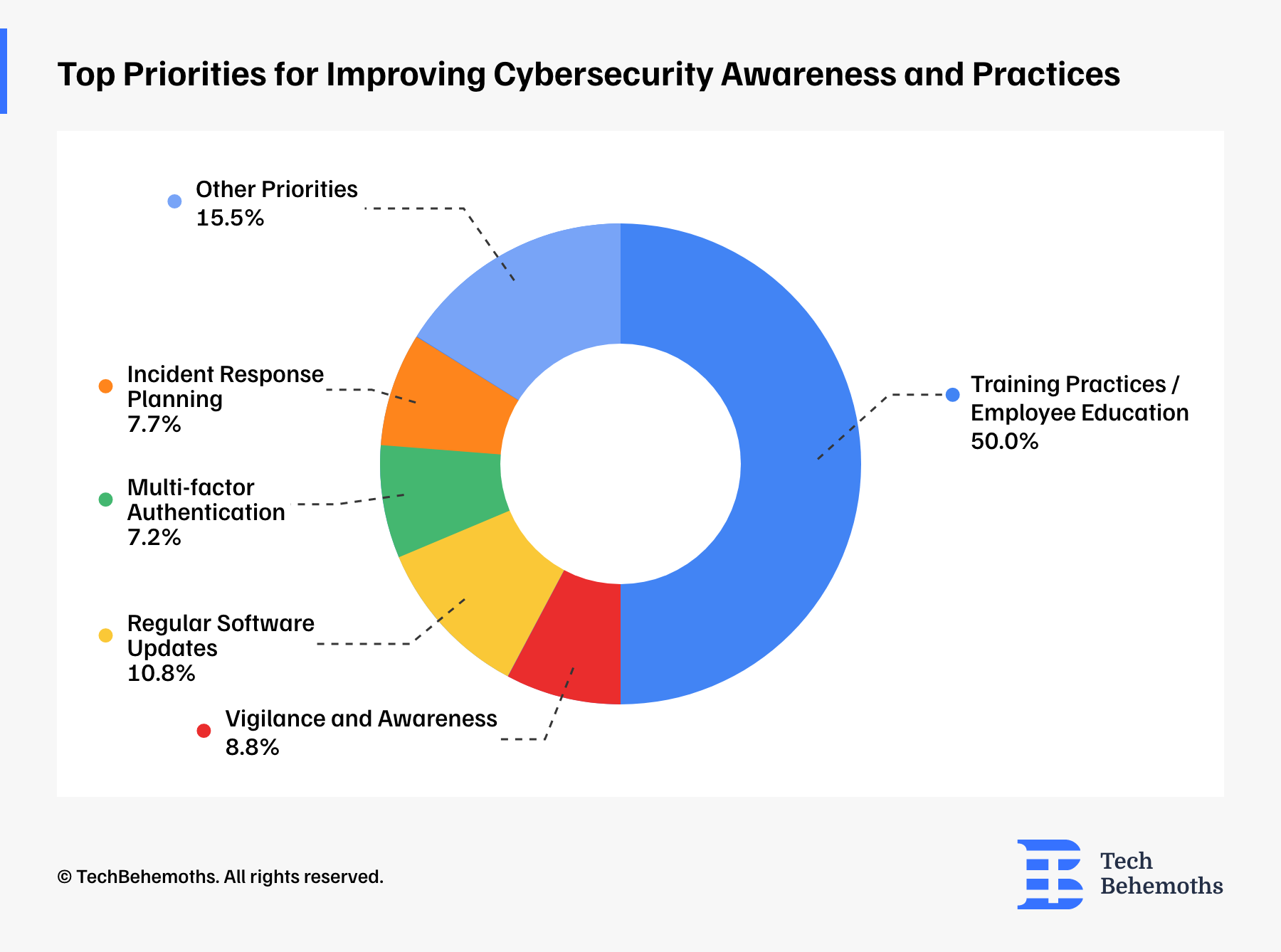
It is important to keep a balance between various security measures, which include employee education, keeping software up-to-date, investing in security audits, implementing multi-factor authentication, using advanced security tools, and preparing for incident response.
By prioritizing these areas and promoting a culture of security awareness, your companies can reduce the risk of cyber-attacks and protect their valuable data.
Survey Conclusions
TechBehemoths' Cybersecurity survey sheds light on the importance of cybersecurity and reveals valuable insights into cybersecurity practices, challenges, and attitudes.
According to the survey, the majority of respondents have confidence that their organization is aware of cyber security threats, with almost 73% believing that cyber security is essential for their company's success. However, the survey also found that organizations are aware of the challenges they face, with the human factor and resource constraints being identified as the main weaknesses.
Despite these challenges, more than half of the respondents are willing to invest more in cybersecurity resources, indicating a proactive attitude toward strengthening defenses and emphasizing the growing importance of data protection. By focusing on these areas, companies can strengthen their defenses and effectively deal with the changing challenges in cybersecurity.
Be vigilant to be protected!
Partner companies
The survey was not limited to any geographical region or country and its main target was the global community of IT companies and web agencies. As such, survey respondents come from 1585 different companies located in 62 countries across the globe. On this occasion, TechBehemoths is proudly announcing and crediting the list of partner companies that helped spread the word and gather answers for this survey.
- CreativSoft, Moldova
- Inbound.BG, Bulgaria
- JET IT Services, China
- Mobiteam, Germany
- Cherryvue, Poland
- Leeway IM, Lebanon
- Cherryvue, Poland
- Elementary, Mauritius
- Launch Digital, South Africa
- Principal Consultant, Nigeria
- Clifton Web Design, United Kingdom
- Percepto, Israel
- Zovo Team Ltd., Bangladesh
- HUSPI, Poland
- Corporation Pop, UK
- ITC Group, Vietnam
- Naturality Digital, China
- Teners, Nigeria
- Spautz, South Africa
- The Business Theory, USA
- PixoLabo, Japan
- Focus Agency Ghana, Ghana
- GPRINTS Nigeria (Genii-Prints Limited), Nigeria
- Appomart, Serbia
- ITC Group, Vietnam
- Digital Marketing, India
- Techvento, USA
- Bacancy, India
- Movadex, Poland
- Incode Group,Poland
- Authorselvi, India
- OnGraph Technologies, India
- Azikus d.o.o, Croatia
- Alto Servicios Comunicación, Spain
- g&co design studio, Poland
- Bulcode, Bulgaria
- Tecalis, Spain
- Myluxtrade digital hub, Nigeria
- Brights, Ukraine
- JetRockets, USA
- Hydralab, Armenia
- Hakkd, Romania
- Exact Software Ltd, Tanzania
- Neslo, South Africa
- IT Consultis, China
- Dudobi, South Africa
- Dcloud Solutions, India
- Silicon Valley Infomedia Pvt. Ltd., India
- NFQ, Lithuania
- Toniceli, Nigeria
- JAM-Forte Technologies, Nigeria
- Adzglobe, India
- FCS Web Development, Portugal
- Devehope Technologies s.r.o., Czech Republic
- Square63, Pakistan
- Creatix Technologies, Armenia
- Asultancy, Malaysia
- Monkeys at Work, Canada
- Altlier, United Kingdom
- Centangle Interactive, Pakistan
- Wild Creek Web Studio, India
- 5w155 SA, Switzerland
- Yalantis, Poland
- Risivonne Investments, Kenya
- Evonicsoft FZE LLC, UAE
- Inventale Custom Projects, United Arab Emirates
- web-aviso, UK
- GOOiZ, Cyprus
- Unravel, Poland
- Edulife Agency, Bangladesh
- Empat, Ukraine
- Rocket House Pictures, USA
- NIX United, USA
- FLLTECH, Armenia
- SunHouse Marketing, Israel
- butcher.studio, Israel
- Shugert Marketing, Mexico
- iLeaf Solutions Pvt Ltd, India
- ThinkWeb, Bulgaria
- Xpertech Solutions Group, Nigeria
- DPL, Pakistan
- Qarbon IT, Poland
- Digital Realism Studios, Jordan
- Digitalhound, United Kingdom
- The Generalissimo Media, Nigeria
- ZnetGuru, Portugal
- QArea, Ukraine
- Digitly, India
- Willbe Collective, Portugal
- Element Media, Palestine
- Webisoft, Montreal
- Brimit, Netherlands
- Snappymob, Malaysia
- Labnify, United States
- Real Wisconsin Website Design, USA
- Livex Software, South Africa
- PanX Project, Egypt
- Fively, Poland
- SkyFig Technologies, Nigeria
- Moody Agency, Ukraine
- Zendev AB, Sweden
- Valmax, Ukraine
- Wintra Advancement AB, Sweden
- W3 Group Marketing, United States
- VSASF NIG LTD, Nigeria
- crystal translation and content creation, Lebanon
- Bespoke Web Dev, Australia
- Epigra, Turkey
- Timspark, United Kingdom
- Holicky Corporation, United States
- Z-JAK Technologies, United States
- Cool Digital Solutions,Turkey
- UClimb Ltd, United Kingdom
- Visagie, South Africa
- Tribe Business Services Sdn Bhd, Malaysia
- Via Kasi Digitals, South Africa
- Bold Online Marketing (Pty) Ltd, South Africa
- Nabu IT Solutions, United Kingdom
- RECIPROCITY ROI, LLC, USA
- [email protected], Bangladesh
- Cosmico Studios, USA
- Elites, Lebanon
- ILB Metrics, Guatemala
- API PILOT, United States
- Resolute Technology Solutions Inc. Canada
- JohnCube, Poland
- Aggital Works, Nigeria
- Jeff Social Marketing, Canada
- YEG Digital, Canada
- Alpha & Omega Computer & Network Services, Inc., USA
- Freshy, USA
- Intuitive IT, Australia
- zeropoint7 Studio, USA
- zyp, Australia
- Beach Chair Marketing, Canada
- Storytale Studio, Australia
- Boylen +, Australia
- Influence IT Consulting Pty Ltd, Australia
- SEO Expert Gold Coast, Australia
- Jucebox Local Marketing Partners, USA
- Perth Web, Australia
- PowTech, Malaysia
- One Pixel Media, Vietnam
- Brand Envoy Africa, Nigeria
- Syntactics, Inc., Philippines
- App Gurus, Australia
- SYZYGY 1 Media, USA
- BugRaptors, USA
- Innov8ive Software Solutions, South Africa
- Performance Hackers, India
- Telsa Media, UK
- Velvetech LLC, USA
- You'll Enjoy, Poland
- VINAStech, Uganda
- Greenhat Services Pty Ltd, Australia
- TOG Africa, Nigeria
- Frankson IT Services, Nigeria
- Gamayas, Australia
- Klein Media, Netherlands
- Profinit, Czechia
- Vinsys, India
- Ministry of Programming, Bosnia and Herzegovina
- Ingsoftware, Serbia
- Roman.ua, Ukraine
- Growth Hackers, Taiwan
- Exemplifi, USA
- Digi Wise, Romania
- Betlace, Ukraine
- Codezela Technologies, Sri Lanka
- CCS Interactive, USA
- Barvy Digital Eye SRL, Moldova
- Double Coconut, USA
- Williams Web Solutions, USA
- ITCAT MEDIA, Hong Kong
- Aptagon Technologies, United Kingdom
- Carina Softlabs Inc., India
- i.am.retailer, India
- Era Biz Solutions, Sri Lanka
- Digital Marketing Agency, Nigeria
- ChatPlus, Japan
- Digismiths.com, Delhi
- Firmao, Poland
- Loovatech, Estonia
- 13 Yardas, Spain
- EVOCODE, Czech Republic
- Eagle IT Solutions, North Macedonia
- Snotor, Latvia
- Innoventix Solutions, India
- IT services, Poland
- web-aviso, UK
- Empathy FIrst Media, US
- Skynix LLC, Ukraine
- Spottmedia, South Africa
- Manderina Marketing and Tourism Consultancy, Albania
- Uniko Studio, United Kingdom
- Exceed IT, South Africa
- BLUFLAMINGO AFRICA, South Africa
- Code Cube LLC, USA
- Epsilon Technology, India
- Techpunto, Lebanon
- GETCORE GROUP LTD, Tanzania
- Risivonne Investments, Kenya
- 23rd Ltd., United Kingdom
- Seclinq, Netherlands
- GIRIRAJ DIGITAL, India
- Leoceros, Lebanon
- WebLab Technology, Estonia
- Women Technology House, Pakistan
- BUSINESS CONFIG, Spain
- SDD Technology, Ukraine
- AppWT LLC, Websites and More, USA
- Atlantic IT Solutions, Ethiopia
- Bac Ha Software Co., Ltd., Vietnam
- InterSynergy, Poland
- Tech Cloud Ltd, Bangladesh
- Future Processing, Poland
- PowerFlite Communications, USA
- evozon, Romania
- Agency, India
- Binmile, India
- Wireless Computer Service, Nigeria
- Boldheart, Germany
- Elites, Lebanon
- Instinctools, Poland
- BrainyZat, Bangladesh
- Nascenia Limited, Bangladesh
- Axpri, Croatia
- Business Config, Portugal
- Codesmith Systems, Kenya
- IT Monks, Poland
- Rise - Growth Marketing Collective, UK
- Maven Media Group, Pakistan
- Carak Marketing, Jordan
- XB Software, Poland
- DTC Infotech, India
- Linnfiy, Romania
- ROOM 1707, China
- Upstack Studio, Malaysia
- Lionix, Armenia
- Navus, Lithuania
- Burlamaqui Marketing & Strategy, Brazil
- Goodwill language solution, Nigeria
- ctrlweb, Canada
- Virva Infotech, India
- Significa, Portugal
- STAMINA MARKETING, Spain
- Newxel, Ukraine
- Digital Present, Belgium
- Byteout Software, Serbia
- Digital Pro Business Services Private Limited, India
- DeviceBee Technologies, United Arab Emirates
- Custom Computers, Germany
- SACTOSOL Technologies, Pakistan
- DigiTrends, USA
- WebOrigo Magyarország Zrt., Hungary
- MWIMMERDESIGN, Germany
- Digital Sail, Armenia
- World Web Technology Pvt. Ltd., India
- Lab3Web, Greece
- Sanara Infotech, Bahrain
- CyberDesign, Pakistan
- Equipy Inc. USA
- Cherryvue, Poland
- AFIVE Digital Agency, UK
- Redo Developers Inc, Uganda
- Level 343 International Marketing & SEO copywriting company, USA
- morphsites, UK
- Devbion, Pakistan
- Profit Parrot Marketing, Canada
- Megadevices, UK
- Ruby Digital, South Africa
- Dropp Technologies, Iran
- LASOFT, Poland
- Dexoc Solutions, India
- ZH IT SOLUTIONS, Pakistan
- Solvd, USA
- CodeOne-X, Sri Lanka
- AMZ DOC INC, Pakistan
- VM Project, Russia
- Trophy Developers, Uganda
- The Law Offices of Thomas S. Carter, USA
- KLH Technology Solutions, USA
- Incode Group, Ukraine
- Breadnbeyond, Indonesia
- Create Ape, USA
- FLYONIT, Australia
- ThinkBIT Solutions Phils., Inc., Philippines
- Wavenex Limited, Hong Kong
- Exemplifi, USA
- Dirox, Vietnam
- IT Brick, Russia
- Concordsoft Solutions, Serbia
- Tezeract, Pakistan
- Techgropse Pvt Ltd, UAE
- Apriorit, Ukraine
- Codment, USA
- Funsize, USA
- Intuitive Digital, USA
- Aarav Infotech India Private LImited, India
- Noitonhive, Bangladesh
- Ledger Labs, USA
- iNFOTYKE, India
- Brela, Nigeria
- Unical, Uzbekistan
- Rootstack, USA
- Mega Vectors, Saudi Arabia
- Catching Clicks, South Korea
- Magnetic Point, Poland
- Marketing, USA
- Inciterz, India
- Redbee Software, Romania
- Leoceros, Lebanon
- Newwave Solutions, Vietnam
- Umbrella IT, USA
- Lizard Global, Netherlands